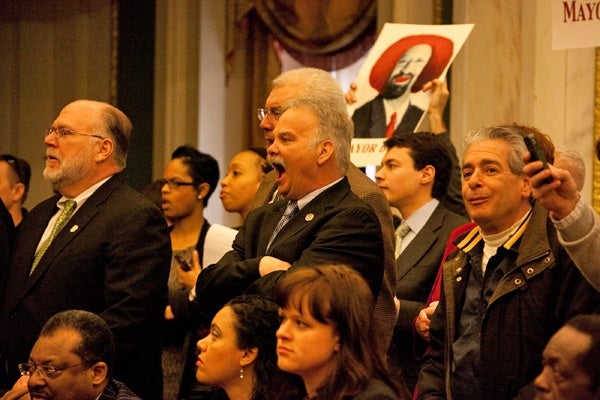How Philly’s proposed $3.75 billion budget almost became an afterthought
It was an unusual day in Philadelphia City Hall. Mayor Michael Nutter started his budget address in City Council chambers, but was forced to retreat shortly after he started. He ended up delivering the address to a room full of reporters and staff in another part of City Hall.
Members of the city’s unions, angered by the mayor’s handling of labor contracts, stomped their feet, blew whistles and flat-out hollered as the mayor tried in vain to outline his plan for the city’s finances.
Councilman Bill Green, who has clashed with the mayor in the past, said he opposed council’s decision to recess when the din drowned out Nutter.
“No matter how you feel about the man, you have to respect the office, and as he said it’s not his house. It’s our house,” Green said. “And so it’s a question of respect for us, and I think that we were treated poorly today.”
Show of union force not surprising
After years of contract impasses between the city and the unions, former Mayor John Street said he had expected a chaotic scene with union members.
“I’m not surprised that they’re reacting this way,” he said. “They are very, very frustrated and think they’re not being dealt with fairly.”
Council President Darrell Clarke defended City Council’s decision to recess instead of clearing the room and arresting protesters who refused to leave.
“It was clear that a lot of people were not willing to leave,” he said, “and indicated they were willing to get arrested. And I think the worst thing that could have happened is to have the police come in force and arrest a group of municipal workers who are simply trying to get a contract.”
The budget address debacle may lead to serious change.
Clarke said after the chaos that he’s grown so frustrated with the unsuccessful contract talks that he will become engaged in the negotiating process between the city and the unions.
He said it’s time to resolve the union impasse so the city can move on. Clarke said that while City Council has traditionally left union negotiations to the executive branch, he thinks it’s time to step up because the union matter has spilled into the council chambers and affected the council’s ability to conduct its business.
Back to the budget
Nutter actually did finally give a budget speech, almost exactly as it was planned, as if nothing strange had happened earlier.
He said that the heart of his $3.75 billion budget centered on revamping the property tax system. City workers just finished the huge task of reassessing every last property in Philadelphia, in an effort to fix the old, inaccurate values.
“The city has operated under a broken property assessment system that no one could really understand and, for too long, it has hurt countless taxpayers,” he said. “But together, we fixed that.”
Nutter is introducing a new property-tax rate of 1.32 percent to go with that new system. City Council has until June 30 to approve that or shoot it down.
Nutter is not seeking tax hikes or service cuts next fiscal year. In fact, he wants wage tax cuts.
He isn’t asking for more money for the schools. However, Nutter said that school district leaders are still hashing out their budget and haven’t come to him yet to request additional funding.
And he proposes spending an additional $99 million, most of which will go toward skyrocketing pension, health-care and debt costs.
And a few words for the unions
Union members might not have been in the room, but Nutter addressed them anyway.
“My goal,” he said, “is to have multiyear contracts with all of our municipal unions. Those include pay raises and needed reforms that respect your work … and that the taxpayers can afford.”
Nutter didn’t include money to fund the firefighers’ recently upheld arbitration award in his next year’s budget, even though council members and fiscal watchdogs have urged him to. He did, however, include $26 million next fiscal year for other future labor costs, including pay raises for firefighters, as well as blue- and white-collar city workers.
Now that he’s presented his budget, the question remains: Can the mayor get it approved?
Another question involves the City Council president. Asked whether he’d use the budget as a bargaining chip to insert himself into labor talks, Clarke declined to show his hand. For now.
WHYY is your source for fact-based, in-depth journalism and information. As a nonprofit organization, we rely on financial support from readers like you. Please give today.











